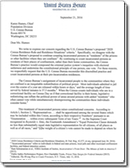13 United States Senators ask Census Bureau to count incarcerated people at home
Thirteen Senators call on the Census Bureau to count incarcerated people at home starting in the 2020 Census.
by Aleks Kajstura, September 30, 2016
In a letter sent to the Census Bureau last week, 13 United States Senators request that the Census Bureau count incarcerated people as residents of their homes in the 2020 Census.
The Senators highlight both practical and constitutional reasons to count incarcerated people at home, concluding:
To ensure that all people are fairly counted as part of their home communities, and in pursuit of our constitutional ideals, we join this chorus of support to ask that the Census Bureau act without delay to correct for this inequality in the 2020 Census.
The Senators’ request echoes 100,000 other voices submitted in comments to the Census Bureau last month. You can read the Senators’ letter in our collection of the comments the Bureau received in 2016.





The critical point is TO LET THE IMPRISONED PEOPLE VOTE. The issue of where they should be considered residents for voting purposes is secondary to that, though important in itself.
The Constitution said “such other persons” (meaning slaves) were to be counted as 3/5 of a person but given 0 part of a vote.
Now, prisoners are counted as 1 whole person and given 0 part of a vote.
So the current situation is worse than the past one in the sense that the prisoners’ bodies strengthen the votes of non-prisoners more than slaves’ bodies strengthened the votes of non-slaves.
Many other countries allow prisoners to vote.
The census issue is mixed: Because prisoners are physical residents of their prison locations, their presence ought to be counted for such things as water allocations in those localities. On the other hand, most prisoners come from urban areas and are imprisoned in rural ones, and the urban areas from which they came and to which they are likely to return need major investment (the disinvestment of those areas may have something to do with the policing and crime and incarceration rates from those areas), and a higher “count” for those areas may help obtain that.
Thanks for tracking this issue. I look forward to a campaign for VOTES for prisoners.
By the way, I was a resident of CA before my imprisonment long ago. In 1970, as a federal prisoner, I was imprisoned during the census count at a federal prison in MO. A guard came into my cell (I was in solitary at the time) with the census forms, interviewed me, entered my responses. I guess I was a Missourian for the 1970-1980 census period (even though I was transferred back to a federal prison in TX shortly after being counted). Strange stories, and ones not without consequences for public policy.
Joseph Maizlish, Los Angeles
So while
Thanks for sharing your story.
I think you will be happy to learn that the issue is not as mixed as it looks on first glance; a person’s physical presence would continue to be taken into account for things like water, sewer, and other services (the city bills the state for their use), as well as funding allocations (school funding, for example, is distributed on the number of students, not total Census population) – none of these rely on Census population. The distribution of legislative power is the primary task for the Census, and so it also makes sense that it should take precedence over any minor indirect impact it might have on how to divvy up highway funding, for example.
And while in Vermont and Maine you can already vote even while incarcerated for a felony (by absentee ballot in your home districts), I agree that it would be nice if campaigns to restore the vote in other states were not facing such hard opposition.